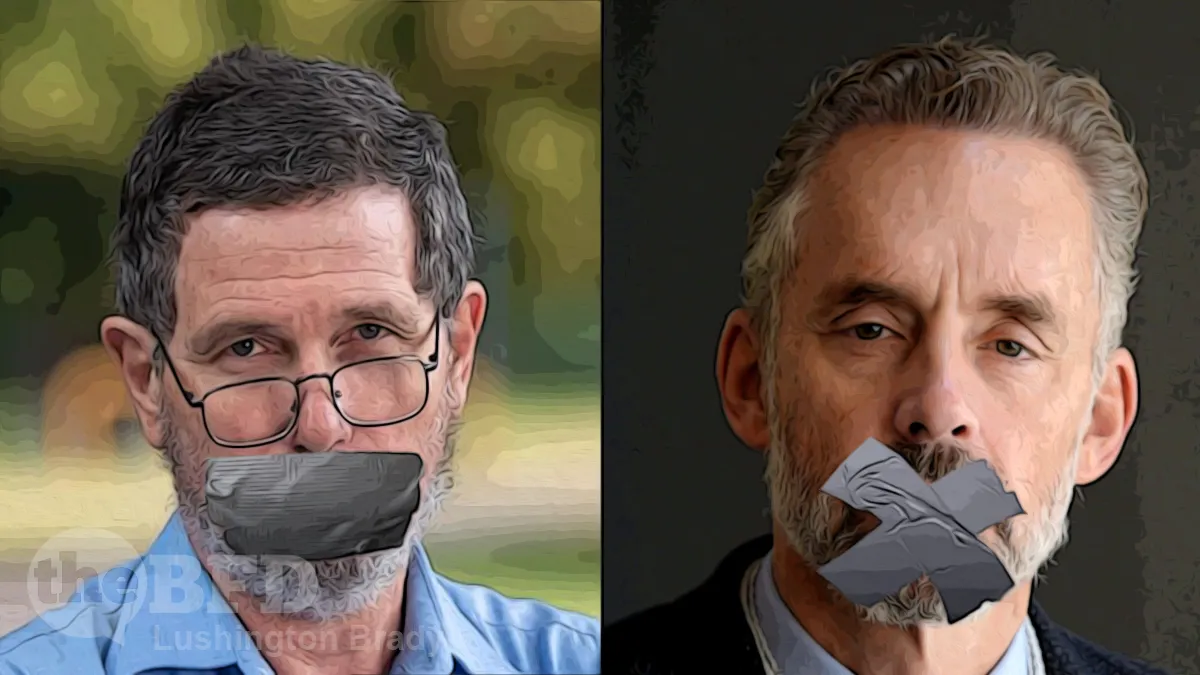Table of Contents
Canadian and Australian professionals are free to express their opinions — as long as they express only the opinions they’re told to.
That’s the clear upshot of the treatment of two high-profile academics, Jordan Peterson in Canada, and Peter Ridd in Australia. Both have been unceremoniously gagged by unelected bureaucrats and courts — even as the same bodies blatherskite about their “freedom of speech”.
Peterson is, of course, the more famous of the pair — and his gag order the most ominous.
A Canadian court has ruled that Jordan Peterson can be instructed to undergo re-education coaching by the College of Psychologists of Ontario if he wants to keep his licence to practise as a psychologist. The CPO objected to some of his comments on a range of topics, including transgender and racial issues, as they could pose “moderate risks of harm to the public”.
Failure to comply to the “coach’s satisfaction may result in an allegation of professional misconduct and the commencement of disciplinary proceedings by the College”.
At the same time, the court pontificates that Peterson is free to “[express] himself on controversial topics” — but he has to abide by the restrictions imposed by the College.
In other words, he is only free to say what they say he’s free to say.
The Ontario judges have agreed that the CPO has the power to mandatorily moderate Peterson’s speech and, if it deems it warranted, to take away his licence to practise if he fails to comply. He has free speech, claims the judges, but only if he sacrifices his professional opinion. As Peterson says, this does not worry him personally because he makes a good living by helping change the world for the better. But all other psychologists in Canada now know what to do – and say – if they want to earn a living.
The intent is obvious: Peterson is being punished in order to set a chilling example. In fact, it’s not really about Peterson at all, it’s about sending a message to every other practising psychologist — and, by extension, professionals across the board in Canada — that if they want to keep their jobs, they better toe the official line on matters of public interest.
Which is exactly what is happening.
In addition, the ruling against Peterson quotes five other Canadian case law examples, all recent, where other professional bodies (nurses, physicians and surgeons) have been given rights to restrict professional speech. One example was nurses who spoke against mask and vaccine mandates. It seems that professional associations in Canada are firmly in control of the speech of their members, and the Peterson case just reinforces this fact.
Having established that a professional body can gag its members on one controversial issue, what’s to stop them doing the same on others? Climate change, for instance?
Engineers, doctors, nurses, accountants, pharmacists, barristers – every professional who is more or less forced to be a member of a professional organisation is probably owned by their professional body. Stray from the official line, and do it in public, and you risk losing your job.
In fact, that’s exactly what they have done to Australia’s Peter Ridd.
The High Court ruled that [James Cook University] acted unlawfully in censuring Ridd for his speech about science quality-assurance, but then ruled that JCU had a right to instruct Ridd to be silent about their unlawful behaviour.
After invoking John Stuart Mill and the importance of freedom of speech, they cast aside that freedom at the earliest convenience.
Peter Ridd was sacked from his job at JCU for publicly pointing out — correctly — the flaws in some of the research used to make alarmist claims about the supposed “death” of the Great Barrier Reef. The university sacked Ridd for not being “collegiate” — that is, complying with academic groupthink.
And it was the same with Peterson and the Ontario Court.
In the first sentence of their ruling, the judges showed their contempt for freedom of expression, at the same time as apparently affirming a citizen’s right to it, by stating: “When individuals join a regulated profession, they do not lose their Charter right to freedom of expression. At the same time, however, they take on obligations and must abide by the rules of their regulatory body that may limit their freedom of expression.”
This makes no sense – they clearly lose their right to freedom of expression if the regulatory body can limit that freedom of expression. So, I say this to the judges: spit it out and say it straight. Peterson lost his freedom of expression. Do not pretend he did not, and do not pretend you did not take his freedom of expression away – because you did.
The Australian
After nearly half a millennium, the “Follow the Science” crowd are still banging on about Galileo (while almost never getting the facts of Galileo’s case correct).
Except, now they’re the inquisitors. When modern day Galileos dare speak up, they are swiftly slapped with an auto-da-fe that would make Pope Urban VIII blink.









